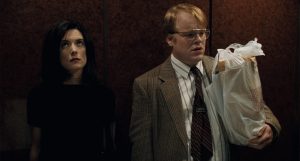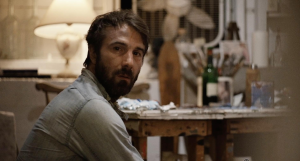
As director Todd Solondz himself concedes in a bonus interview for Criterion’s long-awaited release of 1998’s Happiness ($34.99 4K, $27.99 Blu-ray, $13.91 DVD), the film “never would have been financed today.” This perspective seems to be the consensus, owing to shifting social mores, to increased institutional adversity to risk, and I suppose to wokeism. Down to brass tacks, a film that dares to consider a pedophile with a semblance of compassion is certainly not kosher now, if it ever was. Even in 1998, Solondz was a commercial pariah. Happiness’ original distributor dropped the film, and an NC-17 rating nearly crippled its opportunity at the box office. No home video distributor or streaming service had offered it in 20 years until last month.
Happiness still has the capacity to shock and offend, and its humor has lost none of its pungency. But what I captured in my first viewing of the film in more than a decade is its contemporaneous relevance in the zeitgeist. According to the Department of Health and Human Services and the U.S. surgeon general, we’re enduring an epidemic of loneliness and isolation. This is the tie that binds every character with even a nominal speaking part in Solondz’s rich tapestry of tortured souls.
To summarize just a few of them: There’s Allen (Philip Seymour Hoffman), a miserable drone in a data center whose inability to connect with women manifests in deviant, sexually explicit calls to random numbers in the phone book. His neighbor and central object of misguided affection, Helen Jordan (Lara Flynn Boyle), is a self-flagellating novelist for whom success has brought feelings of disdain and inadequacy. Allen’s other neighbor, Kristina (Camryn Manheim), is as desperately lonely as Allen, with whom she reveals an unspeakable secret.
Helen’s eldest sister Trish (Cynthia Stevenson) is a paragon of superficial contentment — the only character in the film with a seemingly stable suburban home life, two kids and a loving husband, Bill (Dylan Baker), a prosperous psychiatrist. Little does she know that Bill’s pedophilic urges will soon puncture their veil of normality.
Helen’s younger sister, Joy (Jane Adams), an aspiring singer-songwriter, seems on a lifelong quest to find a career, a partner and most notably herself. In the not-so-comforting words of Trish, Joy “always seemed so doomed to failure.” Then there are the parents of this Chekhovian clan of sisters, whose 40 years of marriage has seemingly crumbled overnight thanks to Lenny’s (Ben Gazzara) declaration that he wants a separation from Mona (Louise Lasser). When asked if he’s been having an affair, Lenny tersely retorts, “there’s no one.” Solitude is the succor he’s been missing.
Even characters that appear in single scenes fit snugly into Solondz’s thematic architecture. Rejected by Joy after a few dates, Jon Lovitz’s Andy feebly inquires, like Mona, if there’s someone else. “No,” she replies. “It’s just you.” The next time we see Andy, his corpse is being zipped into a body bag.
Solondz achieves much through simple exchanges like the ones noted above; Happiness is, among many things, a marvel of economical screenwriting. In a new interview with Dylan Baker for this release, he calls the screenplay “obviously the best script I’d ever read.”
In its layered, patient exposures of the desires and perversions buried under the veneers of polite society, it also subverts the form and function of film music. Pay attention to Robbie Kondor’s score, with its subtle, interstitial nods to 1980s sitcom Muzak and after-school specials of yesteryear, particularly in the unforgettable exchanges between Bill and his son Billy, who is dealing with the onset of puberty and its expected sexual growth, so to speak. “I’m not normal,” Billy complains. Don’t worry, his child-rapist father assures him, “You’ll come … one day.”
This recurring motif results in the movie’s riotously funny climax, for lack of a more perfect word; as a double entendre, it’s one of cinema’s great final lines, and in its own way, it’s a positive ending. As disturbing as Happiness can be, it provides glimmers of hope for at least some of its scorned and desperate and hurt people, contrary to Solondz’s reputation as a peddler of a purely nihilistic worldview.
Even in his provocative filmography, Happiness stands apart — for its radical honesty, its boundary-pushing empathy, its jaundiced gaze at modern life. It’s a film with no real precedent and seemingly no antecedent, and it’s a more essential film than it was 25 years ago. Buy a copy now before this one goes out of print, too.
***

Blackout, the 10th feature from indie impresario Larry Fessenden (Dark Sky Selects, $34.98 Blu-ray), shouldn’t be as winning as it is. Its dialogue is stilted, its archetypes shopworn. Its cops are movie cops who say movie lines like “sounds like something rotten’s going on in this town.” Its villain, a craven real estate developer, is so thinly written that his character is an insult to cardboard. Whenever exposition needs to unspool, Fessenden contrives an artificial setup to service this duty.
The film sometimes seems a step removed from a Mystery Science Theater 3000 assignment, and yet, for a certain moviegoer with a penchant for winking nostalgia, it’s a giant step. None of the slights in the previous paragraph would likely come as an insult to Fessenden; like Jim Jarmusch’s similar The Dead Don’t Die, they feel deliberately baked into a pretty tasty cake. Blackout’s innate self-awareness is its trump card, its rebuttal from the meta-verse, and to an outsized degree, it redeems the entire enterprise, “flaws” and all.
Alex Hurt — actor William Hurt’s son — plays Charley Barrett, artist, boozer, conscientious recycler, reluctant activist and, when the (full) moon hits his eye, a wolfman. Charley’s late father was a high-powered attorney for a corrupt land maven named Jack Hammond (Marshall Bell). For a while, Charley dated Jack’s daughter, Sharon (Addison Timlin). But everything in his life begins to fall apart around the time of his lunar lycanthropy, in which he enters a fugue state and kills everyone around him. He wakes up the following morning with a “what did I do last night” headache, and proceeds to swill Pepto-Bismol like it’s his morning espresso.
Charley is a classic antihero, impulsively violent but driven by righteousness: to prevent Hammond from building an environmentally destructive resort in the upstate New York community they share and, when he realizes he’s the culprit of the town’s nocturnal murders, to find someone to assist him in a silver-bullet suicide and clear the name of a local Mexican contractor who has been conveniently blamed for the unsolved crimes.
So yes: Blackout, in the spirit of George A. Romero, isn’t just a creature feature but a movie that tries to reckon with social issues, targeting small-town militia movements and poisonous xenophobia and predatory capitalism. This is all noble, but I mostly enjoyed the many self-conscious Easter eggs nested in the clunky dialogue.
When arguing to deaf ears that he encountered an “hombre lobo,” Miguel, the town’s put-upon patsy, claims his heritage has nothing to do with his vision: He’s only seen wolfmen “in American movies.” When Charley’s friend Earl (Motell Gyn Foster) shows off the silver bullets he’s smelted from antique cutlery, he comments, “it’s very Lon Chaney,” while a show about wolves that no television network would ever air flickers on a boxy old TV behind him.
These little handshakes from the director are legion, and combined with Fessenden’s obvious talent as a director — the mise-en-scène and editing are far above a B-movie baseline — they propel a monster mash that is likeable and slyly layered. The generous Blu-ray’s copious extras include more than 75 minutes of behind-the-scenes footage, an audio commentary from Fessenden, and a recording of the audio play that was later adapted into the film.